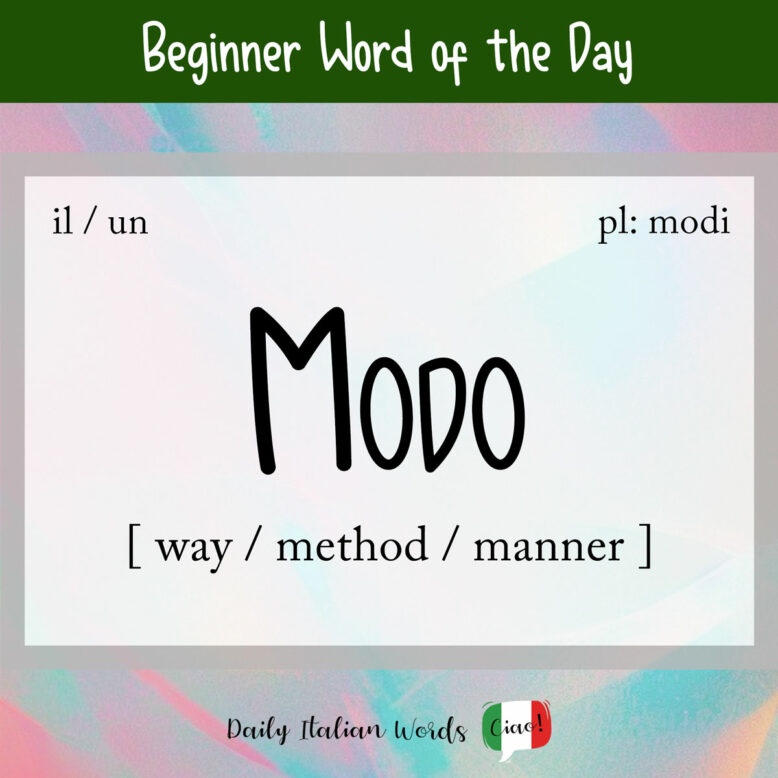Modo is a word that means various things in Italian, but three of the most common translations are way, method and manner. It derives from the Latin modus (“measure”) and can easily be recalled by thinking of the word mode in English.

Because modo is a masculine noun beginning with a consonant, it takes the following definite and indefinite articles:
- il modo = the way
- i modi = the ways
- un modo = a way
- (dei) modi = (some) ways
Let’s begin by taking a look at a chart featuring the most common expressions in Italian that contain the word modo. You can expect to hear these expressions in conversation all the time.
Ad ogni modo
At any rate / In any case
In quel modo
In that way
Di modo che
So as to / In such a way to
In modo da
In such a way as to
Per modo di dire
In a manner of speaking
In nessun modo
Not at all / In no way
Grossomodo (or grosso modo)
About / roughly / approximately
In qualche modo
In some way / Somehow
Allo stesso modo
In the same way / Similarly
In modo che
In order to / So that
In modo tale
In such a manner
In tutti i modi
In every way
Dare modo di
To give somebody a way to do something
Oltre modo
Beyond measure
Perché si comporta in quel modo?
Why is he behaving in that way?
Devi fare in modo che la tua voce venga ascoltata.
You have to make sure your voice is heard.

Some very common verbs you can expect to see used with modo include:
- modo di vivere = way of living
- modo di fare = way of doing (things)
- modo di vedere = viewpoint / way of seeing (things)
- modo di essere = way of being
- modo di pensare = way of thinking
- modo di esprimersi = way of expressing oneself
In addition to way, modo can also refer to a person’s manners or behaviour, similar to the word comportamento (behaviour). When this is the meaning, you will often see modo in its plural form modi.
Che modi sgarbati! Comportati bene per favore!
What bad manners you have! Behave yourself please!
You may also come across the expression a modo, which means that you do something according to the rules or conventions of expected behaviour (e.g. un ragazzo a modo = a respectable, well bred boy).

Sometimes modo can mean opportunity or possibility, as in the following phrase:
Gli darò modo di pensarci.
I’ll give him the opportunity / possibility to think about it.
Two other less common meanings for modo are procedure or means (as in nei modi della legge = by legal means).
Modo di dire (literally “way to say”) refers to an idiomatic expression that people use in everyday life. And a good example of a modo di dire containing modo is C’è modo e modo which means “There’s a right way and a wrong way.“
C’è modo e modo di dire le cose.
There’s a right way and a wrong way to say things.
In linguistics, modo is a grammatical term that means mood (e.g. modi indefiniti = indefinite moods).
A Modo Mio – Claudio Baglioni
A Modo Mio (My Way) is the name of a famous ballad by Claudio Baglioni. It first appeared on the album E tu… (And you…) in 1974. You can listen and sing along to the song on YouTube by following the lyrics below!
Io nella vita ho fatto un po’ di tutto
Non so se ho fatto poco oppure tanto
Non sono stato un santo e questo lo sa pure Dio
Lo sa pure Dio
Ho camminato con la pioggia e il vento
Ho riso spesso e qualche volta ho pianto
E cento e mille volte son rimasto solo io
Ma me la son cavata
Sempre a modo mio
A modo mio
A modo mio
Che tu ci creda o no
A modo mio
A modo mio
A modo mio
Avrò sbagliato ma
A modo mio
E tu che sei comparsa tutto a un tratto
E in un momento hai colorato tutto
Tu sei diversa sei importante e ho paura io
Ho paura io
E chissà se ci riuscirò
A dirti che
Ti amo a modo mio
A modo mio
A modo mio
Per una volta ancora
A modo mio
A modo mio
A modo mio
Poi sei venuta tu
Amore mio
I’ve done a little bit of everything in my life
I don’t know if I’ve done a little or a lot
I’ve not been a saint and even God knows that
Even God knows that
I walked in the rain and wind
I often laughed and sometimes cried
And hundreds and thousands of times I’ve ended up alone
But I always got by
Always in my own way
My way
My way
Believe it or not
My way
My way
My way
I may have made mistakes but
In my own way
And you appeared all of a sudden
And in an instant you gave colour to everything
You are different, you are important and I am afraid
I’m scared
And who knows if I will manage
To tell you that
I love you in my own way
My way
My way
One more time
My way
My way
My way
Then you came
My love
Heather Broster is a graduate with honours in linguistics from the University of Western Ontario. She is an aspiring polyglot, proficient in English and Italian, as well as Japanese, Welsh, and French to varying degrees of fluency. Originally from Toronto, Heather has resided in various countries, notably Italy for a period of six years. Her primary focus lies in the fields of language acquisition, education, and bilingual instruction.


